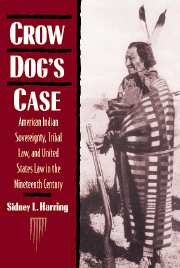 Crow Dog's Case
Crow Dog's Case Book contents
- Frontmatter
- Contents
- Acknowledgments
- 1 “This high pretension of savage sovereignty”
- 2 Corn Tassel: state and federal conflict over tribal sovereignty
- 3 U.S. Indian law and the Indian nations: the Creek Nation, 1870–1900
- 4 Crow Dog's case
- 5 Imposed law and forced assimilation: the legal impact of the Major Crimes Act and the Kagama decision
- 6 Sitting Bull and Clapox: the application of BIA law to Indians outside of the Major Crimes Act
- 7 The struggle for tribal sovereignty in Alaska, 1867–1900
- 8 The legal structuring of violence: U.S. law and the Indian wars
- 9 Conclusion
- Index
1 - “This high pretension of savage sovereignty”
Published online by Cambridge University Press: 23 September 2009
- Frontmatter
- Contents
- Acknowledgments
- 1 “This high pretension of savage sovereignty”
- 2 Corn Tassel: state and federal conflict over tribal sovereignty
- 3 U.S. Indian law and the Indian nations: the Creek Nation, 1870–1900
- 4 Crow Dog's case
- 5 Imposed law and forced assimilation: the legal impact of the Major Crimes Act and the Kagama decision
- 6 Sitting Bull and Clapox: the application of BIA law to Indians outside of the Major Crimes Act
- 7 The struggle for tribal sovereignty in Alaska, 1867–1900
- 8 The legal structuring of violence: U.S. law and the Indian wars
- 9 Conclusion
- Index
Summary
Early on the afternoon of August 5, 1881, on a dusty road just outside the Rosebud Indian Agency on the Great Sioux Reservation in Dakota Territory, Kan-gi-shun-ca (Crow Dog) shot to death Sin-ta-ga-le-Scka (Spotted Tail), a Brule Sioux chief. Great confusion followed as Crow Dog was hunted down by Indian police on the orders of the reservation's chief clerk and locked in a military cell at Fort Niobara, Nebraska. The families of both men met and, following tribal law, settled the matter for $600 in cash, eight horses, and one blanket. A year later, Crow Dog, still in jail, was tried in the Dakota territorial court in Deadwood, convicted of murder, and sentenced to hang. In December 1883, the U.S. Supreme Court reversed the conviction, holding that the United States had no criminal jurisdiction over Indian tribes in “Indian country,” because the tribes, inherently sovereign, retained the right to administer their own law as an element of that sovereignty. Crow Dog returned to his people a hero and a “troublemaker” in the eyes of his Indian agent, living out his life as a traditional leader, resisting U.S. government authority until the end, even refusing to accept his allotment until the year before he died at the age of seventy-five in 1911.
Crow Dog and the origins of U.S. Indian law
Crow Dog's case captures, in one instance, the complex and unique nature of U.S. Indian law.
- Type
- Chapter
- Information
- Crow Dog's CaseAmerican Indian Sovereignty, Tribal Law, and United States Law in the Nineteenth Century, pp. 1 - 24Publisher: Cambridge University PressPrint publication year: 1994
